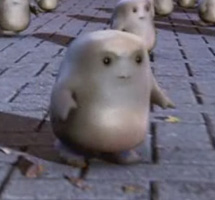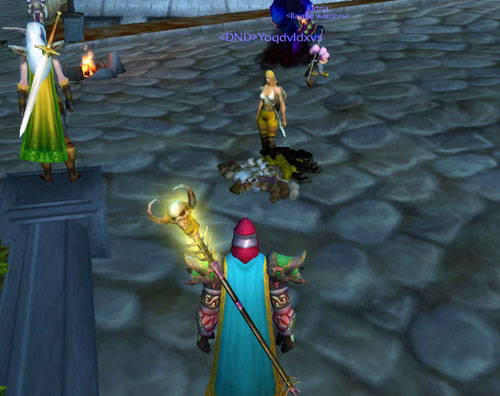Saturday, May 31, 2008
Democratic engagment or PR ruse?
There has been considerable excitement in those interested in virtual world research about the results of the election of EVE Online’s Council of Stellar Management, which is as far as I know the first ever democratic experiment involving users of a virtual world. EVE Online is one of the most hard-core MMOGs in the world, an innovative and vicious global network of players engaged in galactic domination. The game has many interesting features that make it an excellent case study for regulation of the new virtual lands. It is a unique server, which means that unlike more popular games like WoW, all players can engage regardless of location. The game is also based on a unique premise, that of corporate and imperial greed in search of resources with which to bash your opponents. This has been translated into a loyal fan-base of tens of thousands, but little room for expansion, as the barriers to entry for new players are too big to overcome.
Now CCP, the Islandic company behind the game, have decided to empower its player-base by holding elections on the Council of Stellar Management, a body consisting of players which will be flown into Iceland to have direct talks with CCP and game designers. The press release reads:
"Since the earliest days of EVE’s development, we have relied heavily on collaboration with our playerbase regarding world issues. CCP has followed and nurtured what governing and organizational structures emerge within EVE and also brought best practices from the real world into the virtual world,” said CCP CEO Hilmar Veigar Petursson. “The formation of the Council of Stellar Management signifies to us that that EVE has extended beyond the parameters of being ‘just a game’ into something more meaningful. As this first group of Councilors works with us over the course of the next six months, we look forward to seeing how our combined efforts can further expand the potential for virtual worlds to entertain, educate and inspire.”This is quite a unique solution to the issue of governance of virtual worlds, but one has to wonder if it will be a genuine attempt to engage the fan-base, or it will end-up being just a clever PR exercise.
The men and women of the assembly will travel from their homes in the United Kingdom, United States, Netherlands and Denmark to Iceland in June for their first face-to-face summit with CCP representatives at the company’s corporate headquarters in Reykjavik. Speaking on behalf of the players that elected them, the Councilors will discuss EVE-related issues, offer suggestions and exchange ideas to continue the evolution of EVE, which recently celebrated its five-year anniversary."
I found the demographics of voting more interesting than the actual vote itself. Veteran players constituted the largest voting block, and it is interesting to see that while roughly one third of EVE players are American, the actual voting was well-spread geographically.
Regardless of my typical cynical reservations, I believe that this vote is unique. Is this the birth of virtual democracy?
at
00:42
1 comments
![]()
 del.icio.us
del.icio.us
![]()
Labels: Games, Regulation, Virtual worlds
Wednesday, May 28, 2008
On the road
I'm in Curitiba, Brazil, jet-lagged and living off Guarana energy drinks. William Gibson mentions in Pattern Recognition that jet-lag happens when your soul is trying to catch up with you. I suspect mine to be somewhere over the Atlantic at this moment.
I used to love travelling, going places, meeting people, taking pictures in front of landmarks in an attempt to prove I was there. Now travel has become a nuisance and has lost all of its previous appeal. It has become a cliche to say this, but hell is an airport lounge. Forget the pitchforks and lakes of fire, to me there is nothing worse than bland lounges filled with neurotic travellers.
I'll be back to blogging about normal stuff as soon as my soul departs the baggage reclaim carousel.
at
00:46
1 comments
![]()
 del.icio.us
del.icio.us
![]()
Labels: Travel
Monday, May 26, 2008
Travel and "open" wifi
 It's been quiet here in TechnoLlama for a while after knit-gate and the story about gold spammer executions being picked up by the always excellent Terra Nova. I am now off to Brazil for a conference, and as a reluctant traveller and Internet addict I am always very interested in finding adequate wifi coverage, which is not always easy and rather expensive.
It's been quiet here in TechnoLlama for a while after knit-gate and the story about gold spammer executions being picked up by the always excellent Terra Nova. I am now off to Brazil for a conference, and as a reluctant traveller and Internet addict I am always very interested in finding adequate wifi coverage, which is not always easy and rather expensive.
For the last year I have been relying on BT Openzone, which came as part of my home broadband package. However, the free service was discontinued, and it has now been replaced with something called BT Fon. Fon is a really interesting experiment, an international network of users that agree to share their broadband connection with other Fon users. In their own words:
FON is the largest WiFi community in the world. FON is a Community of people making WiFi universal and free. Our vision is WiFi everywhere made possible by the members of the Community, Foneros. We share some of our home Internet connection and get free access to the Community’s FON Spots worldwide!The idea is ground-breaking, yet amazingly simple when you think about it. Road warriors will be used to picking up all sorts of closed networks when roaming the wireless space. The idea is to let you connect to those wireless networks in exchange for making your own service available to others. This seems to me to be a logical step-up of the sharing open ethic exemplified by tools like Wikipedia, Creative Commons and open source licensing. By sharing your resources you also benefit by being able to connect to a network anywhere in the world.
Those legally inclined will certainly get suspicious right now. What are the legal implications? What are the liabilities involved if someone uses your network to download porn, terrorist manuals, unlicensed copyright works, or boot-leg Rick Astley videos? Is there a chance that sharing your connection will make you vulnerable to attacks? Fon say that the connection is secure, and because all users need to user their login in order to connect, a record will be left somewhere that access to that dodgy site was not yours, but it will identify which username did it.
I have to admit that I really like the idea, it has all of the sharing elements that I like about the participatory web. However, I am sort of sceptical about BT's reasons for joining the Fon network. Call me cynical, but I am certain that BT realised that revenue from roaming wifi is not what it should be, and that it was partly to blame on people like me who got access as part of a package. Now they can charge me whenever I need to go online on the road and I cannot find a Fonero. Hopefully, the network will become big enough soon enough.
at
12:55
0
comments
![]()
 del.icio.us
del.icio.us
![]()
Labels: Networks, New technologies, Travel
Monday, May 19, 2008
Machinima for good causes
This is an excellent use of Machinima to illustrate the need for Fair Trade.
at
15:22
0
comments
![]()
 del.icio.us
del.icio.us
![]()
Labels: Meme, Open content, Virtual worlds
Thursday, May 15, 2008
An end to the knitting saga
 I never knew knitting was so popular. Yours Truly had a strange day yesterday, being quoted in The Times, and interviewed in the Daily Mail. The story has travelled far, it has been reported in Wired, Down Under, and even on the CBBC Newsround site (you know you have made it when a story you broke gets reported on the CBBC). To top up a crazy day filled with knitting puns and forgotten Doctor Who episodes, the BBC itself invited me for an interview in E24, BBC News 24 entertainment programme.
I never knew knitting was so popular. Yours Truly had a strange day yesterday, being quoted in The Times, and interviewed in the Daily Mail. The story has travelled far, it has been reported in Wired, Down Under, and even on the CBBC Newsround site (you know you have made it when a story you broke gets reported on the CBBC). To top up a crazy day filled with knitting puns and forgotten Doctor Who episodes, the BBC itself invited me for an interview in E24, BBC News 24 entertainment programme.
The experience was bizarre to say the least. I was invited into the BBC studio in Edinburgh, which is located in a small building in Holyrood Road. I was expecting something bigger, but there were only two people there, and the actual studio was a table with some chairs and a picture of Edinburgh as the background. No staff, no cameramen, just an automated camera, instructions to talk to a plastic cup (literally), and this guy talking into my ear. The interview was over too shortly, and I probably came across as either an illegal immigrant passing off as a university lecturer, or as an over-intellectual geek who needs to get out more (note to self: DO NOT make nuanced legal points in an entertainment program). I felt a bit ambushed, as the person who followed me was a BBC Worldwide exec saying that they invited Mazzmatazz to contact them to reach an agreement of some sort. The interviewer said that Mazzz had just contacted them and had asked where she could get in touch, so everyone wins.
This is a good resolution to all involved I believe. Hopefully the fans can continue knitting Oods, the BBC is seen listening to fans, and we have a nice collection of Dalek puns to ponder. And of course, we do not get a clear legal answer of whether the written instructions for doing something constitute a separate copyright to the artistic work that gave origin to it. Ilanah at IPKat thinks that this could be considered analogous to software and source code. Quite an interesting analogy.
Did I just lose a week pondering Daleks and knitting? I DO need to get out more.
at
08:58
9
comments
![]()
 del.icio.us
del.icio.us
![]()
Labels: Copyright gone mad, Popular Culture
Tuesday, May 13, 2008
Of fan art, mash-ups and licences
 It's week two in the Knitting Wars (or Doctor Who and the Curse of Fatal Copyright). I have been surprised by the level of interest this is generating in the blogosphere, it has been ORGd, EFFd and BoingBoinged, it has also been picked up by the knitting community (I did not know there were so many angry knitters out there!) I have also been interviewed by The Times, so the story may have legs (which in Internet terms means that it will be on the radar for at least a fortnight). There have been some other interesting responses, such as one knitter siding with the BBC, and an excellent article by Jonathan Bailey on where this all fits in the wider fandom picture.
It's week two in the Knitting Wars (or Doctor Who and the Curse of Fatal Copyright). I have been surprised by the level of interest this is generating in the blogosphere, it has been ORGd, EFFd and BoingBoinged, it has also been picked up by the knitting community (I did not know there were so many angry knitters out there!) I have also been interviewed by The Times, so the story may have legs (which in Internet terms means that it will be on the radar for at least a fortnight). There have been some other interesting responses, such as one knitter siding with the BBC, and an excellent article by Jonathan Bailey on where this all fits in the wider fandom picture.
I think that the reason why this story has generated such interest is that it is seen as the typical Amateur David versus the Greedy Goliath. The blogosphere is particularly suspicious of any attempt to remove and take down things (remember the HD-DVD fiasco?) The story also fits well with the picture of corporate greed gone mad, and Brits also love to moan about the Beeb.
I must stress that I do understand why the BBC would want to defend their intellectual property. Doctor Who fans should understand that improved production values are expensive, and that the BBC needs to secure funding to continue giving us quality programming. However, I have to log my complaint about the horrible episode "The Doctor's Daughter", you could literally see the sterling signs in the eyes of the writers when they thought of a new Doctor Who spin-off directed at the teenage market. Even David Tennant seemed embarrassed by the whole thing. Similarly, it has to be said that the Adipose dolls were being sold on eBay by unscrupulous knitters, which appears to have prompted the whole action.
However, copyright owners should recognise that it is the fans who make or break their intellectual property, and as such, one should be very careful when biting the hand that feeds you. Danny O'Brien made the excellent point that it was the fans who kept the Doctor Who franchise alive during the 90s. Copyright owners should also finally understand that just because someone knits a Dalek or an Ood, they will still buy official merchandise.
This brings me to the wider question of fan art. The explosion of user-generated content tools means that it is easier than ever before to make one's own interpretation of a loved character, and to distribute it to the public. Creativity knows no copyright boundaries, and fans are likely to enhance and reinterpret works of popular culture in imaginative ways. Fan fiction, fan art, and mash-ups do not detract from the original work, they enhance the brand. The problem of fan art will not go away with angry cease-and-desist letters, it will only get worse.
Why then not recognise this in the law, and find ways of allowing legitimate non-commercial fan art? Lessig already suggested as much in Free Culture, and Creative Commons is part of a solution. However, it is extremely unlikely that large corporate owners will adopt CC in the near future, so perhaps other solutions are needed. I believe that fan licences are the way forward.
This is already taking place. Microsoft has created a Machinima licence with its Game Content Usage Rules, which allow fans to make derivative works of Xbox games as long as they are non-commercial. Blizzard has also created a Fansite Kit, which allows fans to download high-quality images for use on their own WoW sites. See, smart content owners know that the fans are their best marketing tool, why fight a futile battle against user-generated content, when you can make it work for you?
By the way, the name of that Dalek is "Extermiknit".
Saturday, May 10, 2008
Death of a gold spammer
It is not possible to hurt a character from your own faction without inviting them to duel. Even if a player from another faction got there, he would not be able to kill the spammer, as he needs to be flagged for PvP. However, someone found that a shaman can cast a totem that will give just enough damage for a few seconds to all around it, even players from the same faction. This will not hurt anyone else, but it will kill a level 1 character. Because these are bots, the corpse will sit there, and will not resurrect. One can't spam when one is dead.
There are several legal issues here. Firstly is the legality of killing another player in this fashion. Interestingly, this is an action that is considered to be a game exploit, and therefore it is a bannable offence that would fall under s B.7-8 of WoW's Terms of Use. According to that, users may not:
"7. Harass, threaten, stalk, embarrass or cause distress, unwanted attention or discomfort to any user of the Program;Because the exploit is a bannable offence, the thread where it was explained was deleted, but by the wonders of Google cache, you can find it here.
8. Cheat or utilize "exploits" while playing the Program in any way, including without limitation modification of the Program’s files;"
The second legal question is one of regulation. It seems like WoW is somewhat reluctant to completely stamp out gold selling and spam; see Judge Ung-Gi Yoon's excellent article on the subject (thanks to Nic Suzor for the link). However, there are several regulatory responses to the problem posed by chat spam. The first one is to use the top-down, legislative and contract approach, which is to make this a bannable offence under the terms of use. Sections B.2-3 of the Terms of Use deal with that:
"2. Carry out any action with a disruptive effect, such as intentionally causing the Chat screen to scroll faster than other users are able to read, or setting up macros with large amounts of text that, when used, can have a disruptive effect on the normal flow of Chat;While this is enforced, the solution by spammers is to create characters as soon as the old ones are deleted, which explains why gold farmers are all Level 1. As with email spam, the second solution is code. SpamMeNot is a WoW plugin which filters out most of the chat spam, and a very effective one at that.
3. Disrupt the normal flow of dialogue in Chat or otherwise act in a manner that negatively affects other users including without limitation posting commercial solicitations and/or advertisements for goods and services available outside of the World of Warcraft universe;"
The third solution is the vigilantism described. It is intriguing how virtual communities will revert to community enforcement when they perceive that the legal solutions are not working. Suddenly, it is the Wild West all over again.
I'm sure that Blizzard will soon plug this exploit, but on the meantime, all bots in the vicinity of Stormwind better beware. Avatars are up in arms, and they want revenge.
at
01:40
3
comments
![]()
 del.icio.us
del.icio.us
![]()
Labels: Games, Regulation, Virtual worlds
Friday, May 09, 2008
In defence of Edinburgh
This is not at all related to the law, but I am so outraged that I must speak my mind. The Apprentice UK Edition has brought the reputation of Edinburgh University to the fore. At the heart of the question is a confusion on what constitutes the difference between halal and kosher chicken meat. Michael Sophocles is a former student of Edinburgh, and he did not know the difference , despite being "a good Jewish boy". Margaret Mountford, Sir Alan Sugar's sidekick, reckons that Edinburgh University is to blame. "I think Edinburgh isn't what it used to be," she exclaimed in the boardroom. Kosher-gate has legs, it has been picked up by the wonderful Anna Prickard in The Guardian.
I was more worried about Michael's cheating ways, and his attempts to bribery, than about his knowledge of the intricacies of kosher food. I checked the electronic records and he was indeed a student of Classics at the august institutions that pays my bills, albeit one not holding the most brilliant marks. However, should an institution be indicted based on whether one student knows what Halal is?
We demand an apology from Margaret!
at
07:43
5
comments
![]()
 del.icio.us
del.icio.us
![]()
Labels: Feeling silly
Wednesday, May 07, 2008
Doctor Who: Partners in Copyright Crime
 The good people at the Open Rights Group forwarded me an email they received from a Doctor Who fan that goes by the screen name Mazzmatazz, who has allowed me to tell his/her story. But beware, this is a scary tale of copyright abuse that will have you hiding behind the sofa, or perhaps it will send you into a Whogasm.
The good people at the Open Rights Group forwarded me an email they received from a Doctor Who fan that goes by the screen name Mazzmatazz, who has allowed me to tell his/her story. But beware, this is a scary tale of copyright abuse that will have you hiding behind the sofa, or perhaps it will send you into a Whogasm.
Doctor Who series Four started a few weeks ago with the episode "Partners in Crime". The episode featured a new creature generated from human fat called, what else, the Adipose (pictured below). While I did not particularly like the episode, I reckon that the Adipose made a good showing, and will probably become a memorable Doctor Who creature (much better surely than the lovable yet ludicrous Abzorbaloff). The Adipose however, seem to me to be the Doctor Who equivalent of Ewoks - small and cute creatures which serve little purpose to the plot, and whose value seems to be mainly as merchandising fodder (I notice that others agree).
Enter Mazzmatazz. Mazz has a website featuring photography and knitting. In a display of amazing knitting talent (and dare I say, too much time on their hands), Mazz has been making knitting designs of Doctor Who characters; see for example, the excellent Ood. Under normal circumstances, a fan who makes knitting designs of loved TV characters should not be the concern of copyright owners. However, these are not normal circumstances. The new Doctor Who series is merchandising gold, so much so that the BBC has been climbing up the world merchandise chart. This may confuse people in and outside of the UK. The BBC is not a commercial enterprise, is it? We in the UK have to pay licensing fees (costing a whooping £139.50 GBP per year) to support public broadcasting, so why are the BBC relying so much on their merchandising? This is a good time to get acquainted with how the BBC works. While the BBC in the UK is free of advertising and supported partially by the licensing fee, expensive quality programs such as Doctor Who and Torchwood require investment that goes above and beyond guaranteed funding through licence fees alone. The BBC therefore has an international commercial body called BBC Worldwide, which sells its valuable intellectual property to the world entertainment market. The wide success of titles such as Planet Earth and Doctor Who have pushed BBC Worldwide's sales to more than £800 million GBP, and merchandising is a key part of that strategy.
This is a good time to get acquainted with how the BBC works. While the BBC in the UK is free of advertising and supported partially by the licensing fee, expensive quality programs such as Doctor Who and Torchwood require investment that goes above and beyond guaranteed funding through licence fees alone. The BBC therefore has an international commercial body called BBC Worldwide, which sells its valuable intellectual property to the world entertainment market. The wide success of titles such as Planet Earth and Doctor Who have pushed BBC Worldwide's sales to more than £800 million GBP, and merchandising is a key part of that strategy.
Where does our friend Mazz fit in this picture of corporate success? Well, it seems that the Adipose knitting designs have hit a greed nerve somewhere at the Beeb. While I have a copy of the entire communication between Mazz and the BBC, I will reproduce it partially because the emails come with a confidentiality disclaimer (although I must point out that I believe, as others do, that those email disclaimers are not even worth the bits they are written on). The cease-and-desist letter reads:
"We note that you are supplying DR WHO items, and using trade marks and copyright owned by BBC. You have not been given permission to use the DR WHO brand and we ask that you remove from your site any designs connected with DR WHO. Please reply acknowledging receipt of this email, and confirm that you will remove the DR WHO items as requested."Interesting choice of words to say the least. Further communication continues to stress the point that Mazz's designs constitute unlicensed merchandise, and that BBC Worldwide has every right to stop others from distributing their property. However, Mazz is not selling merchandise, he/she is providing a knitting design to tell others how to make their own versions of the Adipose. While commercial exploitation has no bearing on whether there is copyright infringement, I think that it should be a huge consideration for BBC Worldwide when deciding to prosecute a fan who clearly loves the show.
What about the legal argument? Does the BBC have a case? On the face of it, the BBC would be correct in their assessment that Mazz is infringing their copyright. TV characters are protected by copyright, and all sorts of fan art would be found to be infringing. However, there is a growing body of literature on the subject of the uneasy interaction between fandom and copyright, as many authors turn a blind eye to non-commercial use of their characters online. Of course, when the work becomes commercial, they will take action.

However, Mazz's case is more complicated, as copyright is less clear about transformative art. Nobody would claim that Andy Warhol does not have copyright over his iconic Marilyn portrait, or his Campbell's Soup montages, even if they use other's IP. Similarly, there have been various cases where the mere transformation for artistic purposes from one medium to another was deemed to have enough originality to warrant its own copyright protection (see for example Alfred Bell v Catalda). However, copy too much and you might be found to be infringing, the prime example is Roger v Koons, pictured above. While U.S. cases seem to be moving against transformative copyright, the same cannot be said for case law here in the UK.
 My first reaction when I read about Mazz's knitting case was that this was straightforward infringement, but something kept nagging me. I asked our resident copyright expert Charlotte Waelde, and she remembered some case law which blurs the picture even more. In King Features Syndicate v Kleeman [1941] AC 417, the defendant was accused of having copied cartoon strips depicting "Popeye the Sailor" and placing them in brooches and other media. Although the defendants lost, the issue of the independent design was explored. The Lords found that the figures could constitute designs as protected in the then Copyright Designs and Patents Act 1907. Another relevant case is Anacon v Environmental Research Technology [1994] FSR 659. This case has nothing to do with art, but with circuit design. In this case the defendants made a list of the components in a circuit and their interaction with one another, and then made a circuit on its own that looked completely different to the original. The defendants claimed that the their design was artistic, and therefore different. However, Jacob J found that the actual list was a literary work, and therefore it was subject to copyright protection as such. This is relevant to Mazz's design, as it proves that a knitting design is subject to its own protection, and that it may be dissimilar to the actual artistic depiction of the character. This issue was also explored in Sandman v Panasonic, where Pumfrey J astutely described the dichotomy between design and the item resulting from it to that of musical notation and the resulting tune. Each has its own type of protection.
My first reaction when I read about Mazz's knitting case was that this was straightforward infringement, but something kept nagging me. I asked our resident copyright expert Charlotte Waelde, and she remembered some case law which blurs the picture even more. In King Features Syndicate v Kleeman [1941] AC 417, the defendant was accused of having copied cartoon strips depicting "Popeye the Sailor" and placing them in brooches and other media. Although the defendants lost, the issue of the independent design was explored. The Lords found that the figures could constitute designs as protected in the then Copyright Designs and Patents Act 1907. Another relevant case is Anacon v Environmental Research Technology [1994] FSR 659. This case has nothing to do with art, but with circuit design. In this case the defendants made a list of the components in a circuit and their interaction with one another, and then made a circuit on its own that looked completely different to the original. The defendants claimed that the their design was artistic, and therefore different. However, Jacob J found that the actual list was a literary work, and therefore it was subject to copyright protection as such. This is relevant to Mazz's design, as it proves that a knitting design is subject to its own protection, and that it may be dissimilar to the actual artistic depiction of the character. This issue was also explored in Sandman v Panasonic, where Pumfrey J astutely described the dichotomy between design and the item resulting from it to that of musical notation and the resulting tune. Each has its own type of protection.In other words, I strongly believe that BBC Worldwide's claims are over-reaching. While there could be infringement, I submit the hypothesis that Mazz has done enough transformation to the Adipose character to claim copyright over their design.
The cease-and-desist letter also makes a claim on trade marks. I know next to nothing about this subject, but I would be extremely surprised if BBC Worldwide had managed to register the "Adipose" mark. I did a quick search in the UK-IPO Trade Mark database and I could not find it registered.
Concluding, the BBC may not have a straightforward case if they decide to sue, and they could very well lose. I also believe that they are misplacing their energies pursuing a fan who has done nothing more than to display their love to the show by making a highly original design. While commercial use is not relevant to the infringement case, it should be noted that Mazz was not selling the design, and had actually licensed it under a Creative Commons licence.
So, will the real Adipose please stand up?
Update: I have been dusting off my copyright textbooks looking for more cases relevant to this issue. The important question to me is whether a design arising from a character is an infringement. I have not found anything specifically, but generally copyright protects an original work in most changes of form (say, if a 3D sculpture is made of a 2D image). However, instructions to make things, such as knitting patterns and recipes, are protected only as literary or artistic works, therefore, the item produced from such instructions is not infringing the original design (see Bridgid Folley v Elliot [1982] RPC 433). I have not found a single case however that answers the question of whether there is infringement if the form of the protected character is changed into instructions. Anyone out in the blogosphere know of such a case? Again, Sandman v Panasonic is the closest analogy that I could find, but it is not an exact match.
Friday, May 02, 2008
GikIII
Oxford Internet Institute
September 24-25, 2008
We are glad to announce the third edition of GikII (appropriately renamed GikIII), which will take place 24-25 September 2008 at the Oxford Internet Institute in, errr... Oxford!
GikII is so cutting edge that it is the nano-blade of workshops, so expect all sorts of challenging papers, tenuous legal connections, l33t powerpoint and keynote skillz, uber-geekery, and a healthy dose of lolcatz. Previous GikIIs explored Facebook privacy settings before privacy had become fashionable; it looked at the legal issues in Harry Potter and the Order of the Phoenix, anime, lolcatz, fandom, virtual property and tattoos.
No n00bs allowed.
at
08:07
2
comments
![]()
 del.icio.us
del.icio.us
![]()
Labels: Announcements, Conferences







